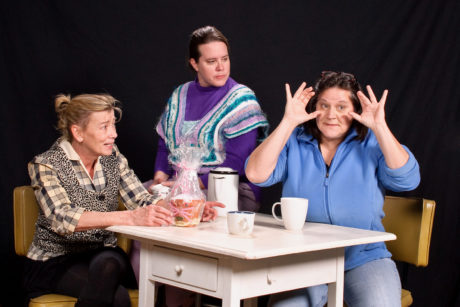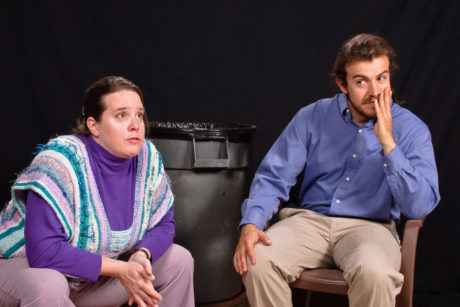The Colonial Players’ Good People is a powerful, emotionally raw production that talks about class, poverty, and race in dramatic ways. Written by David Lindsay-Abaire and directed by Edd Miller, it tells the story of Margaret (Shirley Panek), a single mother struggling to support herself and her adult disabled daughter in South Boston.

Fired by her boss Stevie (Glen Pearson) for being late too many times (from looking after her daughter after her sitter bails on her), she runs into her old high school boyfriend Mike (Ben Carr), now a successful doctor. Thinking he might be able to find her a job, she meets him twice, first in his office, then again at his home, when she meets his wife Kate (Ashley Spooner). Pent-up rage, frustration, and jealousy spill out that threatens to change everything.
Panek, with a strong Southie accent, conveys the sometimes overwhelming sense of desperation from the very first scene. Margaret and her friends Dottie (Bernadette Arvidson) and Jean (Karen Lambert) do everything they can to just barely stay afloat, only for one unfortunate event to have it all spiraling out of control. As Margaret explains to Mike, she lost her car because while eating peanut brittle to save money on food, she cracked a tooth; the money she would have used to help pay off the car went instead to a dentist, and without reliable transportation, she couldn’t get to work on time. She pays Dottie to look after her daughter while she’s at work, but her friend can’t always get up in the mornings because she’s busy making rabbits out of plant pots. Even Stevie is caught between competing needs; he wants to cut Margaret some slack, but his district manager will fire him if his employees are considered “unreliable.” She tries everything to keep her job, even offering to work for less.
This attitude is the source of much of the play’s aggressive dark humor. Jean thinks Stevie is gay because he goes to bingo all the time, and interrogates him about this when they all meet at the bingo hall. Dottie tries to sell him one of her rabbits. These jokes give some much needed laughter in an otherwise bleak story.
Carr and Panek are great at bringing out each other’s misunderstanding and sensitivities when they are together onstage, which makes for some tough watching at times. When they first meet, Mike describes himself as a “reproductive endocrinologist”; Margaret has no idea what that means, saying “I only went to Southie High, you can’t use those $5 words on me.”
Later, at Mike and Kate’s home, this awkwardness between Mike and Margaret turns to outright hostility, as Margaret tells Kate more about Mike’s childhood growing up in Southie.
Spooner is a pleasure to watch as Kate, playing the gracious hostess even as the tension builds between Margaret and Mike. Kate is caught in the middle of these two strong personalities, each pushing each other until they explode in verbal (and at one point physical) anger. Spooner holds her own with Paneck and Carr, going from one to the other as the power goes back and forth. Although Margaret loses this confrontation, she gets in one last little jab at Mike.

The set is cleverly designed by Edd Miller, with the same pieces being used for multiple scenes. Two blocks first become Margaret’s kitchen sink and countertops, then pull out into Mike’s desk, and later turn into bookshelves for Mike and Kate’s home. That is complemented by a rug, a leather chair and sofa, and a roaring fireplace. Margaret’s table and the bingo table are on the other end of the stage, covered by tarps until needed. It is a highly creative use of the space.
The costumes, designed by Dianne Andrew Smith, are simple yet effective. Margaret and her friends’ clothing are modest and inexpensive. They form an interesting contrast to Kate and Mike’s clothes; Kate wears a flowing blue shirt and dark slacks, looking very different from Margaret’s floral print dress. They help to capture the differences between the characters.
Lighting Director Frank Florentine makes an effective use of the lights. After the first scene, a blue spotlight follows Margaret home from work. The lights help indicate scene changes, allowing the stagehands to rearrange the scenery. They also help add to the tension within the play, and the growing intensity of the characters’ mood.
Edd Miller has done a fantastic job directing. He keeps the actors working well together, letting the conflict slowly boil until it reaches an exploding point, and then reins it in for a quiet ending. While the story has an inevitable feel about it, it also unfolds naturally. All the elements work together to drive the plot forward in an intense production.

Good People tackles important issues through the power of theatrical storytelling. While it may be difficult to watch at times, it is worth watching, if only to get a sense of what living in poverty truly means. As the director’s notes mention, hopefully this performance will, “help create some empathy” for people struggling to get by, and the choices they make.
Running Time: 2 hours, with a 15-minute intermission.
Good People plays through June 26, 2016 at Colonial Players of Annapolis – 108 East Street, in Annapolis, MD. For tickets, call the box office at (410) 268-7373, or purchase them online.
RATING:





